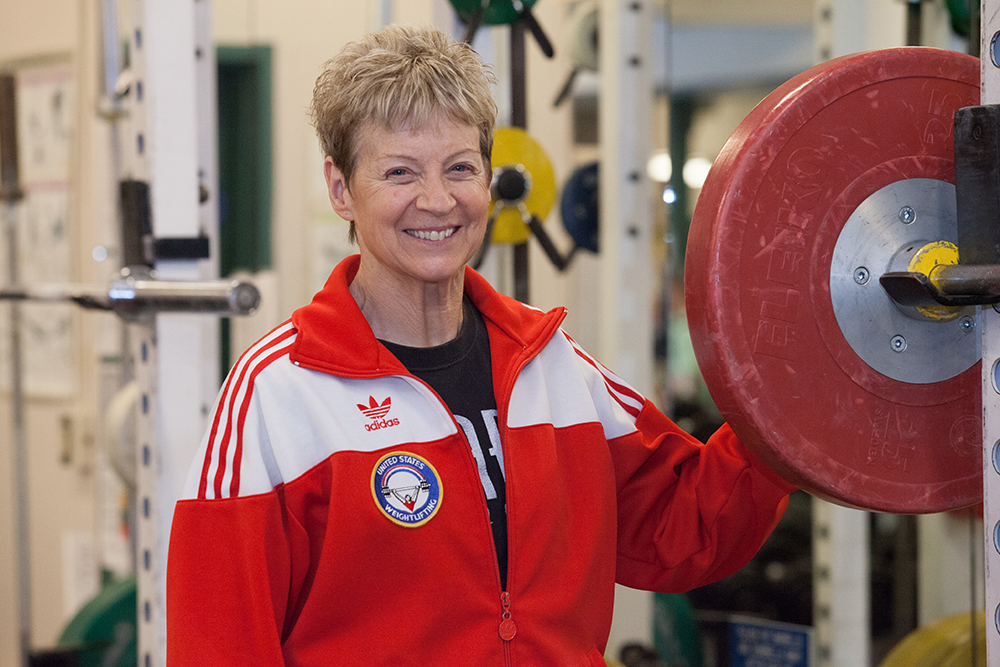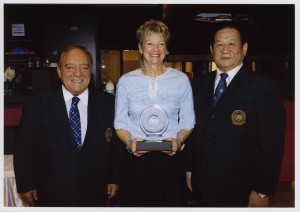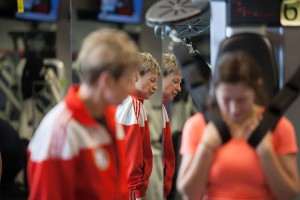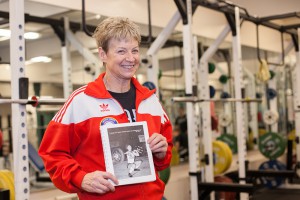Finding Her Strength

Physical Education instructor Judy Glenney stands in Clark’s weight room. “I still train,” she says. “I want students to see physical fitness as a lifelong activity. I don’t intend to quit any time soon.”
Students in Judy Glenney’s physical education classes learn a few things about their instructor early on: She’s funny. She’s patient. She’s happy to meet students where they are, whether that’s “just got off the couch” or “training for my next triathlon.”
What they don’t always find out, however, is Glenney’s landmark role in promoting women in sports–namely, in making women’s weightlifting an Olympic event. In fact, last October Glenney was honored by the International Weightlifting Federation at a ceremony marking the 30th anniversary of women’s competitive weightlifting, held during the IWF’s 2013 World Championships in Wroclaw, Poland.
“She doesn’t toot her own horn,” says Kathy Slavin, secretary of Clark’s Health and Physical Education Division. “We probably would not have heard about the IWF honor except she had to have a sub for her classes while she was gone.”
“I kind of keep it under wraps,” admits Glenney. “I feel like I would be gloating. But every once in a while, especially with my female students, I’ll let it slip–just, like, ‘Yes, you can lift that, even if you’re a girl. I’ve lifted more than 200 pounds.'”
When Glenney herself first became interested in weightlifting in the 1970s, no one was around to provide her with that empowering message. At the time, women weren’t even supposed to lift weights as exercise, much less in competition. Glenney stumbled into weightlifting by accident: While working one summer for a campus ministry, she wandered into the building’s weight room looking for a place where she and her colleagues could work out.
“I looked around at all the weights and stuff and thought, ‘Wow, this is so cool!'” she recalls. “The only person there was this good-looking young man who offered to show me around, and I said, ‘Yes, please!'”
That good-looking young man turned out to be a student named Gary Glenney, who participated in a Christian weightlifting group called Athletes in Action. The two hit it off, and married soon after Judy graduated from Pacific University in 1971.
Judy Glenney would travel with her new husband to weightlifting competitions, and found herself intrigued by the sport. “It looked like gymnastic movements with weights,” said Glenney, who had participated in several athletic teams while in college.

Glenney stands between IWF president Dr. Tamas Ajan and IWF General Secretary Ma Wenguang after receiving an award at the 2013 IWF World Championships in Wroclaw, Poldand. Photo courtesy of Judy Glenney.
Soon she was learning how to make those moves herself. But when she asked her husband about weightlifting competitions for women, he told her there weren’t any–but that he’d be happy to help her start one. At first, Glenney began asking to compete at the men’s competitions. Soon, however, other women joined her–either inspired by seeing her compete or attracted through Glenney’s outreach efforts. She began to push for separate women’s events at some competitions, and the creation of a separate category for women’s weightlifting records–many of which she set herself. But societal resistance to the idea of “lady” weightlifters proved harder to budge than any barbell.
“My first competition was in 1972, and we didn’t have our first national competition until 1981,” she says with a wry grin. “So, yeah, it took a while.”
But Glenney wasn’t content to simply make it into the U.S. Weightlifting Federation. She wanted women’s weightlifting recognized by the IWF as well–and, ultimately, by the premier name in international sports. “In my mind, I was never just thinking national,” she says. “I wanted it to be an Olympic competition.”
That proved no small feat. Glenney lobbied the IWF to include women in its world championships, which it finally did in 1987. But women’s weightlifting didn’t become an Olympic event until 2000. Glenney was there–but as a judge, not a competitor. She had long since retired from competitive weightlifting, finishing her career as a four-time Women’s National Champion, five-time Master’s National Champion, and two-time World Master’s Champion.
Glenney characterizes the Sydney Olympics as a bittersweet moment for her: “Deep down, I was kind of disappointed because I’d missed it as a lifter, but at the same time I was so excited because I contributed to those women being part of the Olympics.”
By then, Glenney had already transitioned into teaching. For 15 years, she has taught classes including Weight Training, Core Conditioning, Fitness Center Basics, and Tennis at Clark College, helping hundreds of students find their own strength.
“She’s an amazing instructor,” says Fitness Center Basics student Anna Rybalka between reps on a weight machine in the Fitness Center. “She manages to be professional and funny at the same time.”
“She’s very upbeat,” says Bryan Andrews, another Fitness Center Basics student, as he adjusts his pace on a treadmill. “She’s personally come over and helped adjust the machines for me. She definitely knows what she’s talking about.”
“At Clark, we pride ourselves on our talented and experienced faculty, and Judy certainly fits those criteria,” says Dean of Health Sciences Blake Bowers. “I appreciate the depth of knowledge she brings to the teaching of physical education, as well as the inspiration she provides not just to her students, but her to fellow faculty members as well.”
“I enjoy the total environment of Clark–the students, faculty, and staff,” says Glenney, whose husband teaches at Clark in the Mathematics Department. “It is just a joy to be around these people and be part of the community of Clark College. The staff everywhere is always willing to help with all my needs, no matter how large or small.”
For Glenney, one of the great joys of teaching is providing her female students with the guidance and encouragement that was absent when she was a young athlete, allowing them to discover their own physical power.
“By the end of the quarter, they’re like, ‘Oh man, look what I can do!'” she says, smiling. “For the first time, they’re really testing their own strength. They say, ‘Wow, I really am strong!’
“And I say, ‘Yeah, you are.'”
Photos: Clark College/Jenny Shadley

